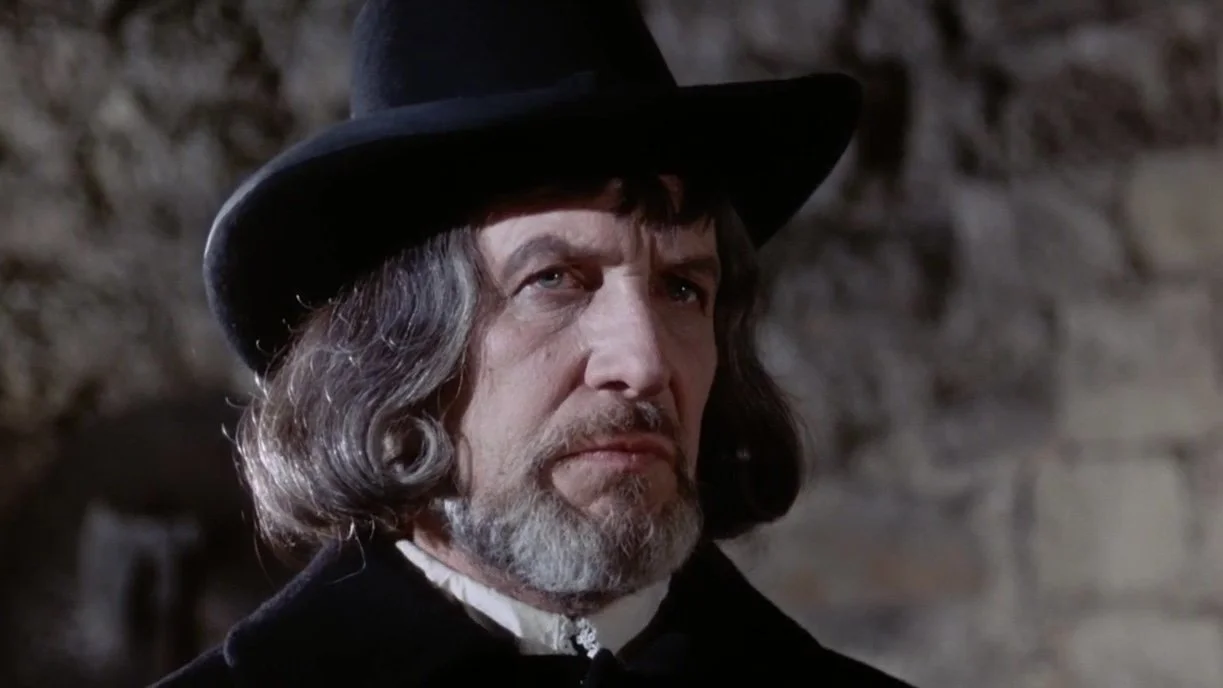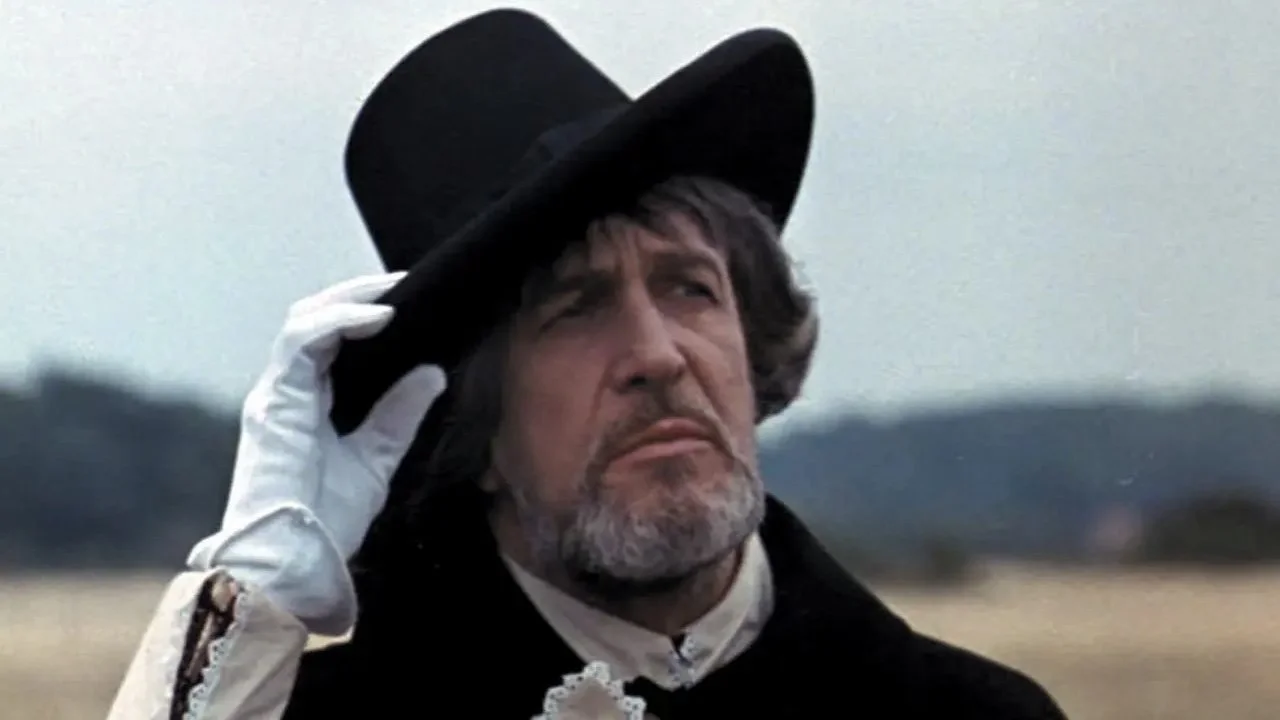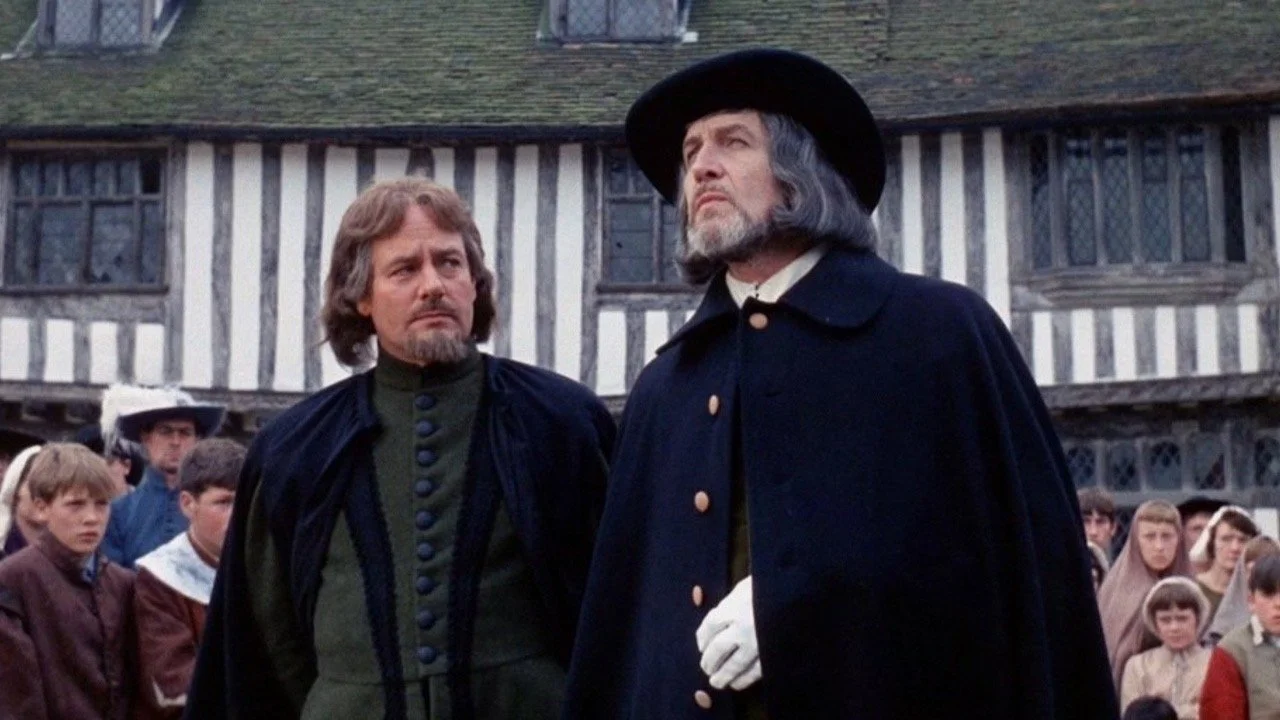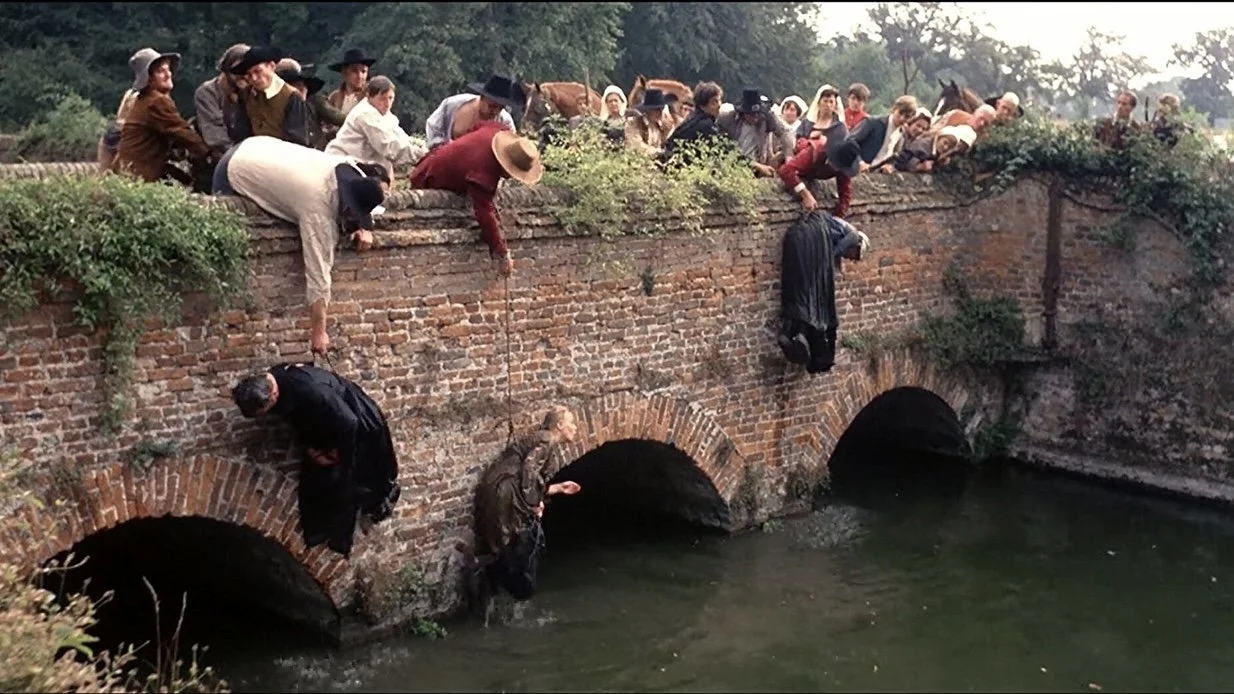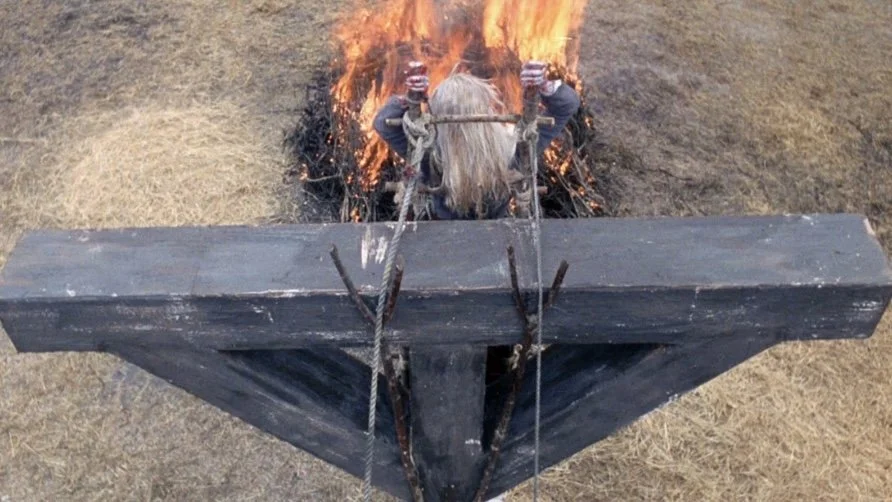Danse Macabre #12: Film Review — "The Conqueror Worm" (1968)
In 1981, Stephen King published Danse Macabre, a work of non-fiction wherein the author acts as a tour guide through the history of horror. He addresses the social issues and political conflicts that have influenced creators over the years, and the ways creators have influenced each other.
King closes out the volume by recommending 96 films and 113 books released during the 1950-1980 period that he feels have significantly contributed to modern genre fiction. With this Fearsome Queer column, I’ll be making my way through those titles in no particular order.
Much like when I reviewed The Creeping Unknown (aka, The Quatermass Xperiment), I find myself in a headline quandary. These days, most folks know The Conqueror Worm by its (better) British title, Witchfinder General, but Stephen King lists it in Appendix I as its American import name because that’s what he knew it as in ’81, thanks to American International Pictures. AIP released the film stateside as The Conqueror Worm in an effort to link it with Roger Corman and Vincent Price’s previous Edgar Allan Poe adaptations, even though neither this narrative nor the characters have any basis in Poe… Nonetheless, gentle reader, I am begrudgingly choosing to headline this post with the inferior US title simply because that’s what King calls it in Danse Macabre—and this is, after all, a Danse Macabre column. However, I’ll be referring to the film by its original and more wicked title for the remainder of this review.
Witchfinder General is excruciating to watch at times (King calls it “revolting”), and it’s bold enough to warn you up front of just how hard it will be to enjoy it, unless of course you’re the Marquis de Sade. The film begins with an anguish-inducing sequence of a woman being brutally and unjustly executed. Her fellow villagers stand by and look on as devout anglican men drag her to the gallows as she pleads for her life with blood-curdling screams of terror, moments after a bogus tribunal supposedly proved that she practices witchcraft. Once she’s hanged, her dead body dangles in the air in a distant wide shot for several seconds. No music, no flourish—it’s nothing personal, merely some pious men doing their godly duty, ensuring that one less witch walks this earth. With such a grim and cold opening, director Michael Reeves shrewdly establishes the filmmaking to come.
The direction of Witchfinder General manages to be both inconspicuous and extraordinary. Reeves was only 24 years old when he directed it, and frankly that surprises me because the film possesses an aplomb that I usually associate with seasoned filmmakers. The shot assembly lacks the freneticism of youth, and Reeves’ compositions are mostly just fine, yet his camera maintains an overall omniscience that green filmmakers often struggle to nail. Reeves’ visual storytelling strives to exhibit a facade of aloofness. In essence, he wants the audience to think the horror speaks for itself… Reeves died at age 25, so there’s no telling if his approach to Witchfinder General was specific to the subject matter or if a semi-detached tone would’ve been a recurring motif throughout his career. (Unfortunately, I’ve not seen his prior two films and cannot comment on their style.) The seemingly withdrawn handling of the material is reflected back beautifully in Vincent Price’s merciless performance.
Matthew Hopkins, the titular witchfinder, presents Vincent Price at his most menacing. Vincent Price was an erudite thespian who tackled every role as if it were haute théâtre. No matter how schlocky or ridiculous the plot, Price acted without a hint of snobbery or condescension toward the text, repeatedly. He had a classical technique and was certainly no stranger to laying it on thick—and he definitely wasn’t afraid of camping up a performance when called upon to do so. In Witchfinder General, however, we witness Vincent Price on a wavelength we’re not always accustomed to seeing him occupy. Price is very reticent and dialed in to the mindset of Hopkins, a man heinously detachment from the suffering and the murdering of the defenseless women he’s paid to persecute. Matthew Hopkins’ low-key near-indifference, as a tormenter, makes him one of the more nefarious villains in Vincent Price’s repertoire.
To think that when Michael Reeves and his writing partner Tom Baker (not the Tom Baker of Doctor Who fame) were penning the script, they had Donald Pleasance in mind… As much as I admire Pleasance, casting him as Hopkins would’ve been a dire mistake. While he’s absolutely a horror icon in his own rite, Pleasance carried himself differently. He likely would’ve hammed up the sadism and provided a histrionic feast for the eyes that would’ve run counter to Reeves’ vision. Reportedly, this is something that Reeves and Price frequently clashed about on set—largely due to Reeves lacking interpersonal skills—with Price eventually acquiescing, but I have a harder time imagining a quirky spotlight hog such as Pleasance giving in. Donald Pleasance very well could have been a fabulous Matthew Hopkins in another director’s film, but Price was right for this version of the tale.
The more I think about it, the more I agree with Reeves’ approach to the story. What makes Witchfinder General so scary is not just the dreadful imagery on-screen—it’s the pervasiveness of Hopkins’ influence, the unwavering credulousness the villagers have for him, and the cunningly despotic ways Hopkins leverages their deep-rooted (and prejudicial) beliefs to increase his sway over them. Watching this film, I couldn’t help but wonder, “Why do these people trust this guy so unquestioningly?! How could they be so easily convinced of what he’s saying to do?!” And, well… I found my answer in my own childhood memories and former stances.
I regret to inform you that I was raised a libertarian-conservative, and that cracked philosophy instructed my worldview well into my 20s. Now, I’m pleased to report, I no longer identify as libertarian or conservative; these days I’m much closer to being a quasi-Marxist, actually. (If adolescent-Tea-Party-me could see me now!) I wasn’t raised in a particularly religious home, mind you. Our right-wing positions were based solely on a fanciful, juvenile pining for total independence. To us, conservatism earnestly meant individual liberties, small/limited government, and an allegiance to the (supposedly infallible) US Constitution—you know, the things radical conservatives say they’re for as a smokescreen for their own brand of tyranny. Christian piety played no part in our political outlook, not professedly anyway. The evangelism of prominent conservative personalities was merely incidental—those conservatives were just practicing their constitutional right to freedom of religion, and to hold that expression against them would be uNcoNstiTUtiOnaL.
Even though we did not go to church or worship a god, our political ideology was very much intertwined with a deism of our own making. In a fucked-up sense, the US Constitution was our Holy Bible and our household was a polytheistic society devoted to the Founders (always with a capital F). Thomas Jefferson, James Madison, Thomas Paine—those blokes and many of their contemporaries were practically deities. In other words, our “higher powers” were long-dead ideologues; their thoughts, ramblings, and pithy quotes were tantamount to scripture.
Now, here’s where the Matthew Hopkins connection comes in. Because what’s a non-religious creed without men-of-the-cloth proxies on pseudo-pulpits? Growing up, we didn’t attend service, but we did tune in to Rush Limbaugh. We didn’t receive communion, but we did watch Sean Hannity. We didn’t read bible stories, but we did peruse John Stossel books. Compelling conservative voices with huge soapboxes possess a treacherous authority over their followers—and they fuckin’ know it. They know what their supporters believe, and they know what they can get them to believe. And perhaps most importantly: they have a financial incentive to never stop spewing nonsense and encouraging foolishness, no matter how outrageous or harmful it may be. Propagandists get paid when people buy into and share their bullshit. The combined cash flow and notoriety keeps their platforms afloat. Likewise, Matthew Hopkins gets paid every time he’s able to suss out and execute a “witch,” and his continued “success” keeps his profile raised.
Hopkins’ craving for infamy and power has suppressed every shred of decency and morality he may have once had—and the monetary perks aren’t bad either, I’d imagine. The dude doesn’t care how many wives, mothers, and daughters are killed at his insistence, so long as he gets his coins and god-fearing folk everywhere fear his name, too. Hell, I’d be scared if he waltzed into my neighborhood. Setting aside the fact that I’m gay and therefore already a servant of Satan, anybody Hopkins chooses to single out is pretty much doomed to a horrible and painful public death.
Reeves doesn’t need musical accompaniment to heighten the tension during these scenes. His wide shots say what they need to: the image of the giant cross being steadily lowered onto the raging bonfire, for instance, will be burned in my brain forever. Reeves manages to put his moviegoing audience in the POV of, well, the public square audience. We are tasked with witnessing poor, generally upright people endure violent deaths from a modest distance, as if we too are powerless townspeople who wouldn’t dare speak up, since that would only be seen as an admission of culpability and result in an identical fate. There is no proving one’s innocence. All of Hopkins’ trials and tests are designed so the accused dies, one way or another. He rigs the system to assure that he always wins. So, best to stay in line and not waver, to avoid standing out—to remain a “good” Christian.
Herein lie the dangers of homogeneity, or “purity.” Matthew Hopkins travels up and down the countryside, where puritanism is the way of life, where one’s existence is defined by how close they are to the Lord, where anyone who strays from that standard poses a risk to the rest. Hopkins uses that idea to prey upon those on the fringes, those whom the pious are most-ready to renounce… The conservatism I grew up with had a similar purity test. I don’t know how many times I heard the term “true conservative” as a kid. This is what we strove to be. To deviate from “true” conservatism meant drifting toward [gasp] socialism—a blanket term for things conservatives don’t like. Such tests of one’s faith are an obedience tactic, plain and simple. Some go to great lengths to be perceived as “true.” Or, perhaps it’s more accurate to say, some go to great lengths to not be perceived as untrue. Getting through to such a person, who’s determined to remain unshakeable in their faith, is damn-near impossible, especially when there’s an indefatigable specter confirming their convictions and gassing them up at every turn.
The villagers accept Matthew Hopkins’ persecutions of their friends and neighbors because they view him as an arbiter of God. They spend their days fearing the dark touch of Satan, then lo and behold here comes the witchfinder general to cast the devil out once and for all—or at least until he seeks another payday. In that sense, the evil depicted in Witchfinder General is heartless, human greed. There are no real witches or Satan worshippers here (not that there’d be anything wrong with that). The villain is a materialistic, egotistical false-intermediary for God who exploits the worries and insecurities of lowly people to make himself richer. He doesn’t do it while twirling a fiendish mustache or diabolically snickering in the shadows. Matthew Hopkins presents himself as a righteous hero, a purveyor of everything holy. And once someone becomes a dedicated follower, severing them from their misguided beliefs becomes even harder.
Moving far away from home at 18 was probably one the best things that ever happened to me in that regard. My untangling from libertarian-conservatism was a slow and delicate process. It literally took years to unlearn the “truths” that had been ingrained in me; I was in my mid-20s when I first considered myself left-of-center. Had I stayed in my rural Ohio hometown, I might still be a right-wing monster… Few will have that experience. Most never leave their opaque bubble of reassurance—definitely not when there’s a trusted almighty figure routinely persuades them not to!
